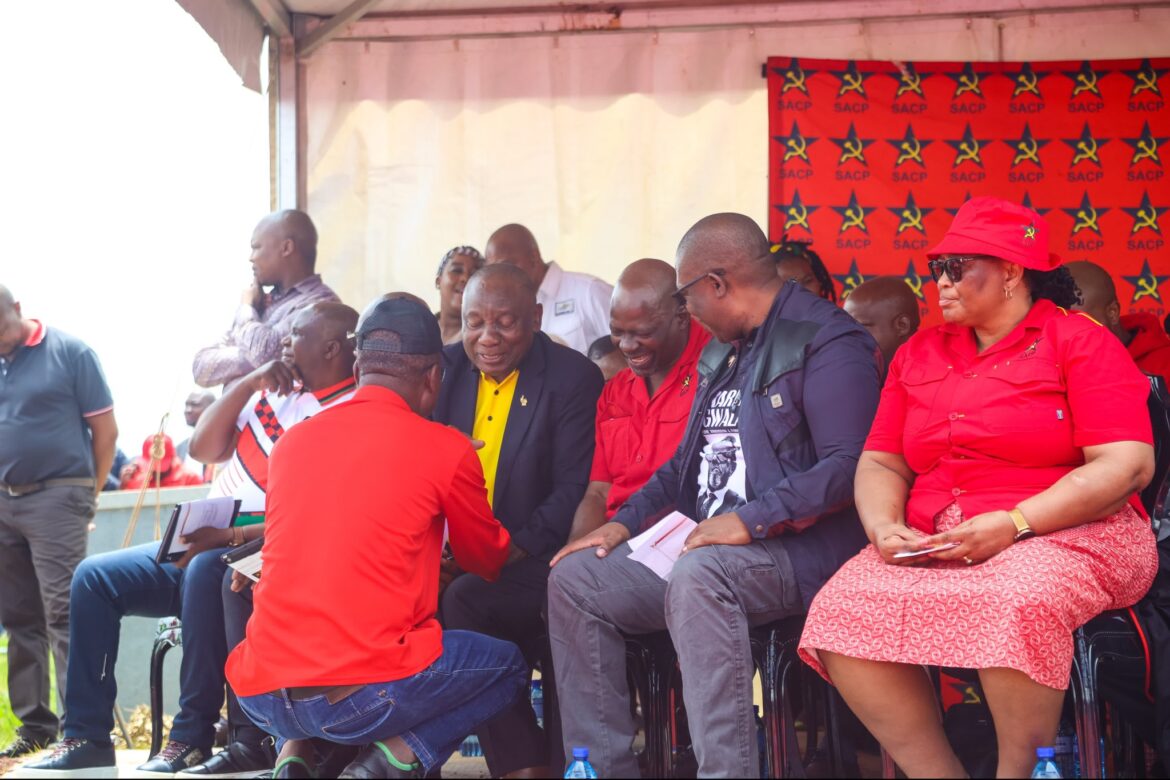Amid chants of “we do not want the GNU” (Government of National Unity), the relationship between the African National Congress (ANC) and the Democratic Alliance (DA) came under scrutiny on Sunday during the South African Communist Party’s (SACP) commemoration of anti-apartheid icon Joe Slovo at the Avalon Cemetery in Soweto. The event, which drew significant political attention, highlighted the deep divisions that continue to shape South Africa’s political landscape, particularly within the ruling ANC.
At the event, President Cyril Ramaphosa, accompanied by SACP General Secretary Solly Mapaila and Cosatu leader Duncan Luvuno, paid tribute to Slovo’s pivotal role as a founding member of Umkhonto we Sizwe (MK) and his enduring legacy in the struggle against apartheid. However, it was Mapaila’s harsh criticism of the DA that captured much of the political attention. He accused the DA of being “hyenas gunning to finish off the ANC,” reflecting growing tensions between the ANC and the opposition party. Mapaila also voiced concern over the Government of National Unity, warning that the coalition could pose a significant threat to the ANC’s stability. “We are aware of the reversals that are taking place at the strategic level,” he said, emphasizing the challenge of combating poverty, which remains a key issue for the ANC.
In his speech, Mapaila reaffirmed the SACP’s commitment to contest the 2026 local elections independently of the ANC, a decision he claimed was not intended to weaken the alliance but to strengthen it. “We want working-class representation,” he asserted. Ramaphosa, while acknowledging the importance of collaboration, emphasized that the ANC has been a pillar of strength for the SACP, and vice versa. He reiterated the necessity of cooperation to advance the National Democratic Revolution (NDR), underscoring that both organizations should continue to work together for the broader cause of liberation and development.
Meanwhile, another flashpoint in the ANC’s internal politics arose as the party’s Secretary-General, Fikile Mbalula, addressed supporters in Cape Town. He spoke strongly about discipline within the ANC, warning that members who attack the party or its leaders would face disciplinary actions. Mbalula specifically named Tony Yengeni and Obed Bapela, two senior ANC figures who have recently drawn criticism for their actions. Yengeni, who has been outspoken against Ramaphosa, also represented former ANC president Jacob Zuma in an internal ANC disciplinary hearing. Bapela, on the other hand, faced backlash for a controversial trip to Morocco, where he was accused of misrepresenting himself as an ANC delegate and contradicting the party’s stance on Morocco and its relations with Algeria and Western Sahara.
Mbalula made it clear that Yengeni and Bapela would face charges this year, insisting that discipline is crucial for the integrity of the ANC. “Raising views and ideas is not a problem,” Mbalula said. “But attacking the organization or casting aspersions on the leadership of the ANC will not be tolerated.” He also highlighted that some provincial ANC leadership had turned a blind eye to disciplinary issues, but the national leadership would take action to address members who bring the party into disrepute. His remarks raised questions about the party’s internal democracy, with political analyst Thabani Khumalo suggesting that Mbalula’s stance could either be seen as stifling open debate or as a necessary move to uphold internal order. Khumalo pointed out that Mbalula needs to consider why senior party members feel compelled to voice their criticism outside the party’s internal structures.
At the SACP commemoration, Ramaphosa reflected on the importance of maintaining a robust democracy, one that allows for diverse voices to be heard, including critical ones. He stressed that Joe Slovo’s contributions were central not only to the fight against apartheid but also in shaping South Africa’s democratic future. The SACP, in its statement, lauded Slovo’s leadership in the armed struggle, noting that his strategic brilliance and theoretical contributions were vital in shaping the country’s revolutionary path. However, the party also expressed concern over the pressing challenges of poverty and inequality, particularly among the youth. Despite a decrease in the official unemployment rate to 32.1% in the third quarter of 2024, the expanded unemployment rate, including discouraged work seekers, remains alarmingly high at 41.9%. Youth unemployment is particularly severe, with a staggering 45.5% of young people aged 15 to 34 unemployed.
The SACP highlighted the continued plight of millions living in extreme poverty. As of 2024, approximately 13.2 million South Africans are surviving on less than R18.78 per day, a grim reminder of the work still needed to achieve Slovo’s vision of a more just and equal society. In this context, the commemoration of Slovo’s life was not just a tribute to a past hero, but a call to action for addressing the systemic issues that persist in modern-day South Africa.
This series of events underscores the growing tensions within the ANC and its allied organizations, as well as the broader political discourse in South Africa. While leaders like Ramaphosa and Mapaila emphasize unity in the face of challenges, the deepening divisions within the ANC and the ideological differences over key issues like the GNU and internal discipline are reshaping the political terrain as the country approaches the 2026 elections.
